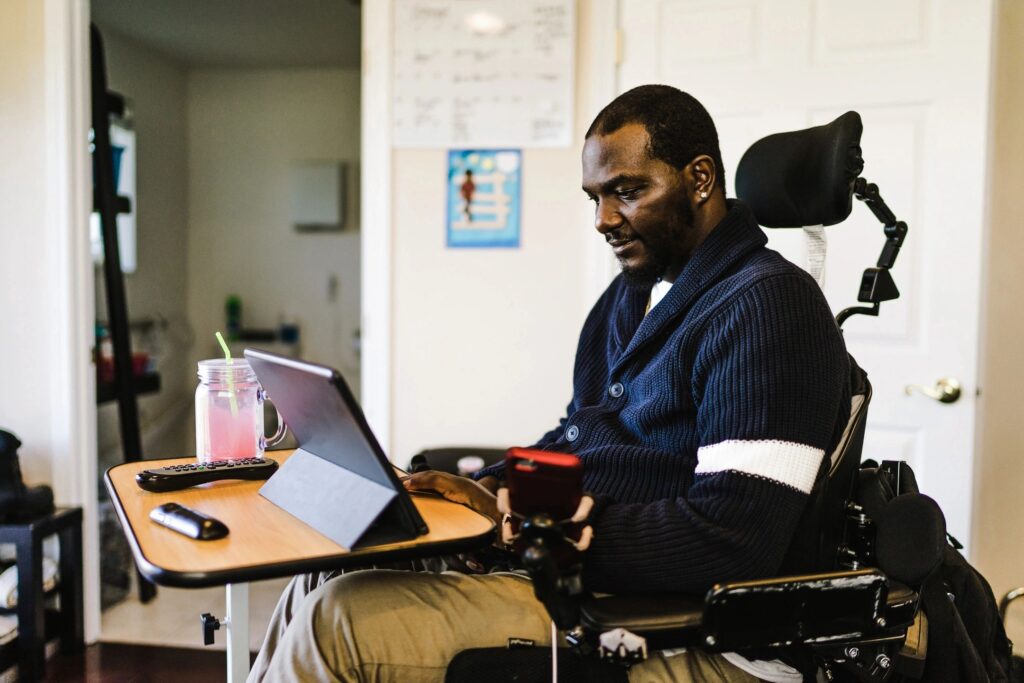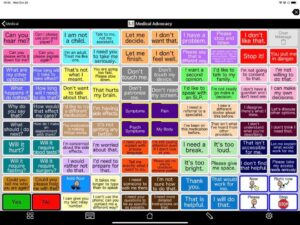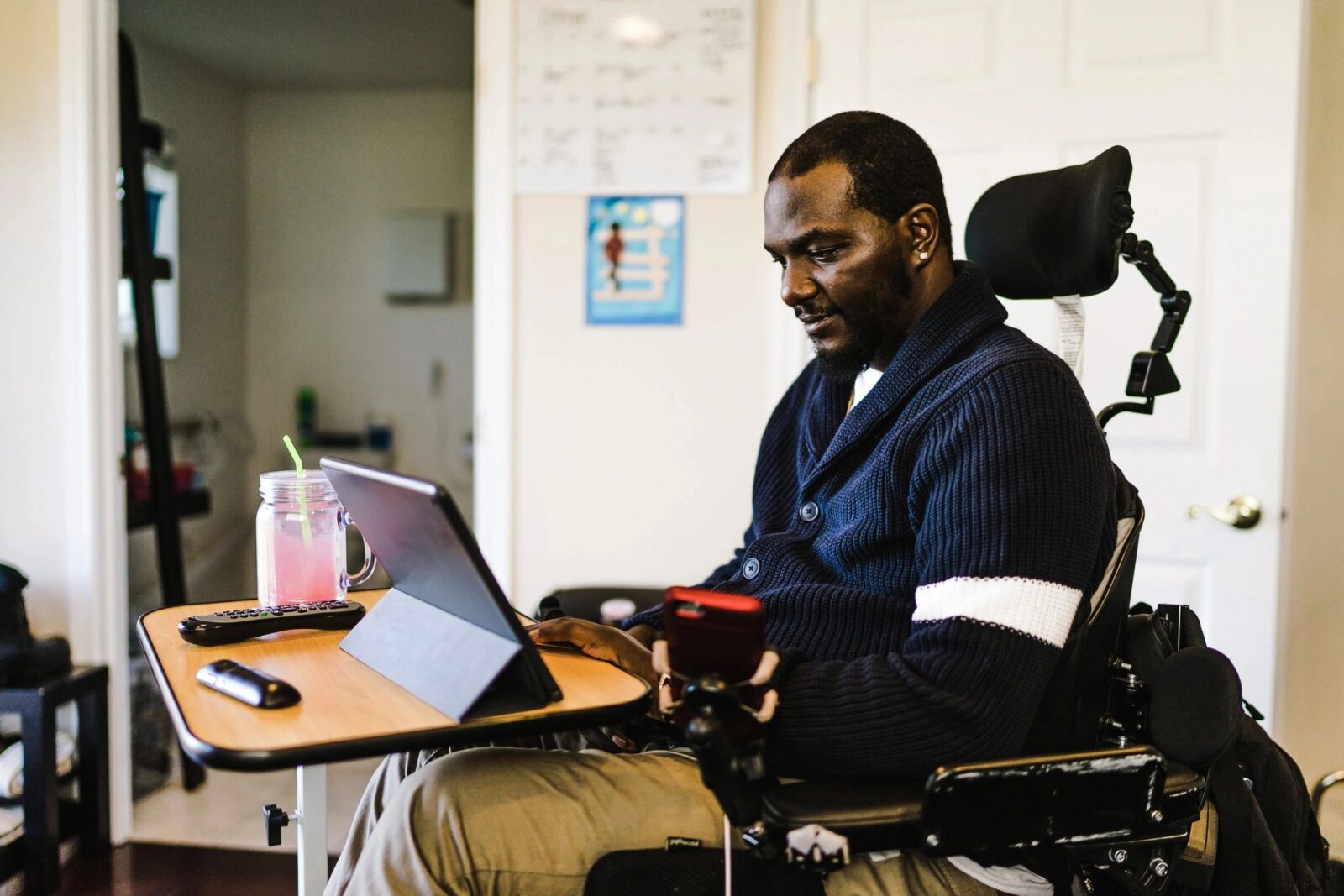Assuring Better Communication for Deciding (ABCD) Together in Health Care Project

ABOUT
The ABCD Together Project was carried out in partnership between CommunicationFIRST and the ACES Institute at Temple University Institute on Disabilities with the generous support of the WITH Foundation. The Project’s aims were to:
- Convene a national panel of thought leaders with personal and professional experience in augmentative and alternative communication (AAC), cultural competence, shared health care decision-making, supported decision-making for persons with intellectual and developmental disabilities (IDD) to develop a clear vision and recommendations;
- Engage Temple University’s ACES Institute as a proving ground for the ABCD Together Project’s ideas and recommendations; and
- Work with the the AAC-using participants of the ACES Institute to develop and disseminate the resulting tools, including an advocacy video toolkit, white paper on rights, policy, and best practice, and tips for effectively communicating and making informed decisions in health care settings.
This toolkit is designed to assist people who rely on AAC, healthcare providers, and family members to improve communication and decision-making in health care. It includes downloadable tools, webinars, and instructions and personal examples for developing your own personalized tool for communicating with health care providers.
We are thankful to the WITH Foundation, for its vision and leadership in improving health care for people with intellectual and developmental disabilities and its generous support in funding the ABCD Together Project.
quick links
Insights and Advice from AAC Users on Health Care Communication
Make Your Own Advocacy Toolkit (for AAC Users)
ABCD Issue Brief
ABCD Participants and Thought Leader Panel
ACES Program at Temple University
CommunicationFIRST Communication Rights Toolkit

What I Want My Doctor to Know Advocacy Toolkit for AAC Users

The Assuring Better Communication for Deciding (ABCD) Together Advocacy Toolkit was created by engaging Temple University’s ACES Program and about two dozen AAC users from across the country to test and refine the project ideas, recommendations, and develop resource modules for AAC users to communicate with health care professionals. AAC users, ACES staff, and CommunicationFIRST personnel and consultants were involved in training, role playing, peer support, and developing materials to equip AAC-user participants with tools to make informed health care decisions. These tools include four topic specific webinars and PowerPoint presentations, 2-3 minute “what I want my health professional to know” video examples, and a do-it-yourself guide to help others develop their own videos.
ABCD furthers the goals of both CommunicationFIRST, which is led by and committed to increasing equal opportunity and support for individuals who use AAC, and ACES, a leader in equipping AAC users with the skills to effectively communicate. This toolkit is designed to be helpful to AAC users, healthcare providers, family members, and allies. It includes instructional webinars and PowerPoints, personal examples, downloadable tools, and suggestions on developing tools for communicating with health care providers.
Especially powerful insights and advice from the AAC user participants in the ABCD Project were compiled from the seminar chat box and are shared with permission here.
TOPIC 1: Talking with Doctors: Who Gets to Decide?
“I want my doctors to understand I want comfort without sacrificing function and to be treated like the human being that I am with dignity and respect. I also prefer when my doctors speak directly to me and not my parents.” — Caitlyn Connolly, ABCD Participant
Healthcare decision making was the first topic of the What I Want My Doctor to Know strand. The webinar covers the four tenets of informed consent, what happens when you and your health care professional disagree, and how to take charge of conversations about your health care.
- PowerPoint slides (PDF)
- Webinar recording (coming soon)
- Why Informed Consent Is Important (a helpful four-minute captioned video of ABCD Thought Leader Dr. Clarissa Kripke explaining in plain language)
TOPIC 2: Talking with Doctors: Shared Decision Making Using the SHARE Approach
“I am working on using SHARE with my upcoming appointments! It is such an empowering experience to tell the doctor to talk to me. I did it in my appointment yesterday. Respect my rights.” — Danny Whitty, ABCD Participant
Making an informed, well-reasoned decision on whether to consent to or refuse consent for a treatment often is complicated, complex, and stressful. It is unfair to expect most patients to make such decisions solely by themselves. For this reason, the practice of shared decision making in health care (SDMHC) is now recognized as the preferred standard for discussing health care options. SDMHC is a framework guided by the evidence and expectation that better health decisions can be made when an individual, their physician, and health care team have meaningful discussions – not just as a one shot deal but as frequently as necessary – about their health and well being and the choices that need to be made regarding it.
The aim of SDMHC is to encourage conversations that lead to shared health care decisions that are made in a balanced manner that takes evidence-informed practices and what matters most to the individual – their preferences and values – into consideration. To achieve these results, the US Department of Health and Human Services Agency for Health Care Research and Quality (AHRQ) designed and promotes the SHARE Approach that emphasizes the importance of physicians and other practitioners facilitating these conversations by taking five steps:
-
-
- Seek the patient’s active participation in discussing, evaluating and deciding health matters
- Help the patient explore, understand and compare treatment options
- Assess the patient’s values and preferences
- Reach a decision with the patient based on evidence as well as values and preferences.
- Evaluate the extent that the decision reflects medical evidence and values and preferences.
-
- PowerPoint slides (PDF)
- Webinar recording (coming soon)
- Downloadable one-page document about SHARE (coming soon) is a terrific resource to review and share with your health care provider.
TOPIC 3: Strategies for Communicating with Doctors: Patient Portals and Partners
“My primary care [doctor] always schedules me at the last appointment she has before lunch - an appointment time that she usually saves for emergency appointments. That is another time that for some doctors there can be extra time in.” — TuttleTurtle, ABCD Participant
“Also, for a lot of multiply disabled people, there isn't ‘reliable’ information out there on how our bodies/minds work and how our conditions overlap. The information that does exist is often patient/individual testimonials that professionals dismiss as anecdotes. It's so frustrating that doctors demand such a high standard of evidence from us when that evidence sometimes
doesn't exist or isn't accessible.” — Donnie Denome, ABCD Participant“I also wish there were more options for communicating access needs to medical workers other than just health care providers. I don't know how I'm supposed to let the front-desk workers in my doctors' office know that I can …” — Donnie Denome, ABCD Participant
“Please talk to me, not my aide.” — Mark Steidi, ABCD Participant
Using electronic patient portals, the role of a communication partner, healthcare messaging for non binary, trans, and LGBTQ AAC users are topics included in these resources.
- PowerPoint slides (PDF)
- Webinar recording (coming soon)
- Talking with Doctors Medical Advocacy (a helpful 5-minute captioned video by ABCD Participant Donnie TC Denome)
TOPIC 4: What I Want My Doctor to Know: Creating Your Own Tools
“I use an advocacy form to share how I want communication and decisions to be addressed.” — Isaac Baldry, ABCD Participant
Creating tools for communicating with health care professionals is presented. Tools include videos, scripts, blog posts, and other communication strategies developed to share personal and healthcare information with doctors.
- PowerPoint slides (PDF)
- Webinar recording (coming soon)
Resources for AAC Users Created by AAC Users
- Talking with Doctors Medical Advocacy (helpful 5-minute captioned video by ABCD Participant Donnie TC Denome)
- AAC Phrases for Medical Advocacy (blogpost and screenshot of a page of medical advocacy-related phrases ABCD Participant Donnie TC Denome made for their AAC device)
- How to Be a Respectful Communication Partner with AAC Users (blogpost created by Caitlyn Connelly)
Resources for Health Care Providers
- Why Informed Consent is Important (4-minute captioned video by ABCD Thought Leader Dr. Clarissa Kripke)
- Responsive Practice; Making Public Health Care Accessible, University of New Hampshire Institute on Disability and Public Health Project: The Responsive Practice trainings are online, on-demand, and free for a limited time. Responsive Practice enhances health care providers’ ability to deliver disability-competent care that is accessible to people with intellectual, mobility, and other disabilities.
Additional Resources
CommunicationFIRST COVID-19 Communication Rights Toolkit (link)
This toolkit, available in English, Spanish, and Chinese: (1) explains your rights to access in-person and other types of communication supports in healthcare settings; (2) provides tips on advocating for them, and (3) includes an accommodation request form you can bring to the hospital.
Free Patient-Provider Communication Tools (link)
This website includes free downloadable communication boards, decisionmaking boards, yes-no boards, pain scale boards, and more in English and bilingual tools in 17 other languages.
Office Developmental Primary Care Resources on Supported Decision-Making and Communication (link)
Georgetown University National Center for Cultural Competence (link)
National Disability Rights Network Supported Decision-Making and Healthcare Project (WITH-funded) (link)
National Council for Interpreting in Health Care (link)
Resources on ethics and standards of practice in interpreting in health care contexts, as well as working papers and research on language barriers in health care
Listening to People Rarely Heard (link)
Resource aimed at people with significant intellectual disability and their supporters around supported decision-making in health care

